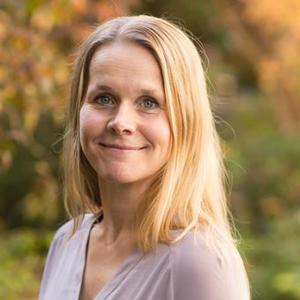The European Research Council (ERC) has decided to award so-called Consolidator grants to three research projects at Linköping University. These grants are awarded to researchers in mid-career. The aim is to give them the opportunity to solve major and important research issues over a longer period of time.
In addition, a research project has been awarded a Proof of Concept grant. This enables researchers who have already received funding from the ERC to further develop their research results.
Consolidator grants
Johanna Rosén – SEK 20 million
Johanna Rosén, professor in the Department of Physics, Chemistry and Biology. Photo credit Anna Nilsen The goal is to build a platform to find and explore new low-dimensional materials. That is to say, material with a large area relative to its volume. To find this type of new material, large-scale theory and modelling is required to guide the researchers' work in the lab. In addition, new energy-efficient methods are needed to synthesise the material.
The large area that the researchers hope to create should also be able to be tailored to have unique characteristics that enable, for example, energy storage and catalysis.
“Materials development has always been important, and now more than ever in light of the transition we have to make toward a more sustainable society. There are many applications in energy and the environment, where I hope my ERC project will be able to contribute," says Johanna Rosén, professor in the Department of Physics, Chemistry and Biology.
Klas Tybrandt – SEK 26 million.
Klas Tybrandt, associate professor at the Laboratory for Organic Electronics. Photo credit Magnus Johansson Injuries, diseases and disorders of the brain and nervous system are a major health issue for those affected and entails large costs for society. Examples of conditions that affect the nervous system are Parkinson's disease, epilepsy, chronic pain and severe depression.
Electric stimulation is currently used in clinics to treat various injuries and diseases in the nervous system. However, the technology used has a relatively low resolution which makes it difficult to closely connect to nerve cells in tissue without damaging it.
"We are going to develop new ultra-soft, stretchable and biocompatible materials and electrodes that can be integrated with the nervous system without damaging surrounding tissue. In addition, we will explore new methods of placing clusters of electrodes deep within tissue without harming it. In the long run we hope that our results will lead to new clinical treatments," says Klas Tybrandt, associate professor at the Laboratory for Organic Electronics.
Magnus Jonsson – SEK 33 million.
Magnus Jonsson (right) professor at the Laboratory for Organic Electronics. Photo credit Thor Balkhed "Our goal is to develop controllable optical nanoantennas that works for visible light. In the long term, they can be used in many types of applications, to produce video holograms for example," says Magnus Jonsson, professor at the Laboratory for Organic Electronics.
By placing optical nanoantennas in different patterns, they can form a type material called optical metasurfaces. There are already optical metasurfaces that are used for ultra-thin flat optical lenses, OLED screens and many other things. The phenomenon can also be used for innovative concepts such as invisibility materials. However, the applications that exist today mainly use static materials. The ability to configure and control the function is necessary to expand the potential areas of application.
"My research group has previously developed controllable nanoantennas based on conductive polymers, but they only work in the infrared light spectrum. The challenge is to get the same function in the visible spectrum," says Magnus Jonsson.
Proof of Concept grant
Feng Gao – SEK 1.5 million
Feng Gao (middle), professor in the Department of Physics, Chemistry and Biology. Photo credit Anna Nilsen The need and demand for renewable energy sources is growing. One of the most promising renewable sources is solar power. A new type of solar cell based on organic semiconductors and halide perovskites offers many advantages over traditional silicon-based solar cells. They are lightweight, flexible and can be easily integrated into buildings and other infrastructure.
However, for the new type of solar cell to be applied in practice, the material in the so-called charge transport layer needs to be cheaper to manufacture.
"The aim of this project is to close the knowledge gap in order to reduce the cost of the charge transport layer. "We want to contribute to an increased number of new solar cells by delivering technological solutions for modern energy production," says Feng Gao, professor in the Department of Physics, Chemistry and Biology.




